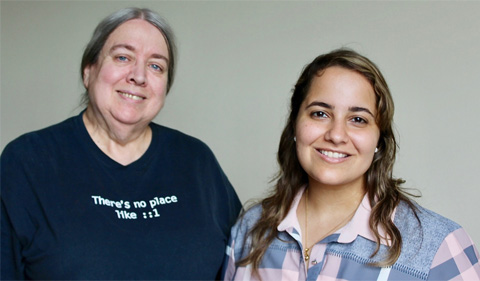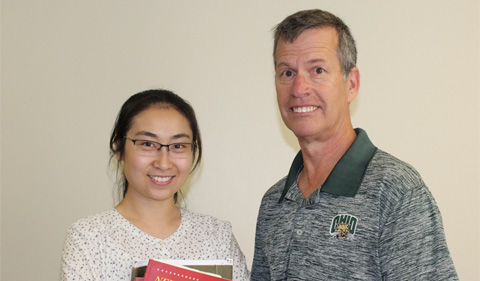Two students from the Ohio 60+ Program are taking advantage of tuition-free courses this semester in Linguistics and History departments at Ohio University. One is getting the college experience she missed. The other is pursuing an intellectual challenge.
Carol Sedgwick is studying Arabic, and Dr. Joseph Kittle Jr. is taking Chinese.
The 60+ Program is a legislatively mandated program which allows Ohio residents who are at least 60 years of age to attend courses either for credit or not, without paying tuition or matriculation fees.
‘Having the College Experience I Wish I Had’
Sedgwick, who is now in her second year of Arabic, worked for over 30 years with General Electric as a systems analyst before retiring to Little Hocking. Initially, she had wanted to study Farsi to help her teach English to Iranian refugees who are members of the Bahá’í community in Columbus. But OHIO University doesn’t offer Farsi, so she chose Arabic. Although they are in different language families – Farsi is an Iranian language in the Indo-European family of languages, and Arabic is a Semitic language in the Afro-Asiatic group of languages – the writing systems of Farsi and Arabic are both based on Arabic script.
“I love the classes here. I think they are very good. I like the book that we are using. It is more of a teach yourself and teaches conversational skills, which really helps you learn faster,” said Sedgwick, who also has been supplementing her OHIO classes with trips to Egypt. For the last two years in January, she has participated in a two-week intensive Arabic program at the International Language Institute in Cairo, which consists of three hours of modern standard Arabic and two hours of colloquial Egyptian every day, 25 hours a week in class plus homework. And more recently, Sedgwick has started doing two hours of online classes with the same school.
“I am having the college experience I wish I had because when I went to college before, I was working full time,” Sedgwick explains. “I didn’t do the traditional high school, college, then job. I did high school, job, then college. It was night school. I did as many credits as I could, and I was exhausted all the time and I didn’t do anything outside of class apart from homework and go to work. I had no life for five years.”
Now at OHIO, Sedgwick is finally having the college experience she missed. She is a member of the Arabic Language Student Association and is taking a history class: Middle East History 1500 to the present with Dr. Abu-Rish, Assistant Professor of History and Director of Middle East and North Africa Studies. “I really enjoy coming up here to OHIO, she says. “I am having a good time.” And although she is not taking classes for credit, she still likes to do all the quizzes and tests.
Carol would like to continue her Arabic with the aim of ultimately reaching a B2 level of proficiency or higher according to the Common European Framework of Reference for Languages or CEFR. A B2 level of proficiency means that Carol would be considered an independent user of Arabic who can interact with a degree of fluency and spontaneity with native speakers. Carol is also interested in learning Hindi or French here at OHIO. Carol is very aware of the studies showing that people who know more than one language tend to postpone the onset of Alzheimer’s. “Having watched two members of my family suffer with senile dementia,” she says, “I am also using my language studies as sort of a “vaccine.”
‘Wanted to Have a New Intellectual Challenge’
Kittle is a molecular biologist and has his own bio-tech company. He was a chemistry undergraduate at Ohio University in the 1970s and then went off to graduate school. He came back to Athens as an Assistant Professor of Chemistry and Biochemistry from 2011 to 2015. He taught freshman Chemistry.
“I had 400 students. I couldn’t do that and run a bio-tech company, although I tried for a while,” Kittle says. Two factors prompted him to start studying Chinese.
“First, I just turned 60,” he explains, “ and I wanted to have a new intellectual challenge. And second my company has business in China with WuXi Biologics.”
Kittle has not been to China yet. “I don’t imagine that I will be able to conduct business in Chinese,” he recognizes. He is learning Chinese for two reasons. First, to show respect for the culture through the few words of greetings he does know, and second, “I want to enjoy my visit, so with a bit of Chinese I can shop and go to restaurants, and even talk to friends.”
Kittle had been preparing for his Chinese classes for several months by using the online Duolingo app.
“I am an older learner and I want to do a good job,” he says. “I am probably not as quick but on the other hand I know how to take a class and how to focus on studying. I can anticipate what’s going to be on the test. I can study properly – I have good study skills.” Kittle knows some Spanish, so he sees Chinese as almost his second foreign language. But he has found that being a student is quite different from being a teacher.
“I had to learn all the electronic media part like Blackboard. We didn’t have that when I was an undergrad here, not even in grad school.” On the other hand, interacting with fellow students is the easy part. “They are fun,” he says. “I am just getting started, so I don’t know them that well. But they are not all freshmen. There are a couple of grad students in there.” But the biggest challenge has been squeezing the classes into his work schedule. “You have to prioritize the class even though you can find other more important things to do,” Kittle explains. “You won’t survive in Chinese class if you miss classes. I’m pretty good at chemistry, but this is really hard.”
One fascinating fact about Kittle’s biography is that he is originally from Appalachia. He grew up in Glouster and has a large extended family here.
“I have five acres up near Burr Oak Lake. All of my neighbors are my cousins. It was my grandfather’s land,” he explains. When he came back to Athens County, he reconnected with the land and the people. “Being here is part of who I am.” Kittle has an office in the Innovation Center, but does most of his work from his office at home. “This morning before class,” he says, “I was on the phone with my CEO in Pennsylvania and WuXi Biologics in China. I am doing business in China 15 minutes before I show up in class.”
Sedgwick and Kittle’s teachers are certainly impressed by their 60+ students.
“You feel as though she wants to know more than just the language. She asks about politics and culture,” says Amy Khazaal, Sedgwick’s instructor. Khazaal also notes that Sedgwick’ is doing better than many of the younger students. Her handwriting is really good, and she is always the fastest to finish in-class exercises. “She cares a lot about the class,” Khazaal adds, “and I miss her a lot when she can’t make it to class.”
Lu Cao, Kittle’s instructor, is equally glowing in her assessment. “He’s really passionate in the class, his motivation is really strong,” she says. “He says he likes this class and I am really happy to know that. He does all the homework and takes all the quizzes even though he is auditing the class. He seems to really enjoy it.”experienced learners with very real-world learning needs, and inspirational role models to their more traditional classmates.
For more information about the 60+ Program please contact Brenda Dorst, Registrar Services Supervisor dorst@ohio.edu.





















Comments